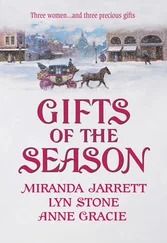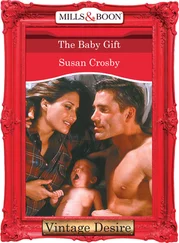Caleb reached across the seat for the roses and got out of the truck. His palms were damp and left marks on the florist paper.
He stepped over the heavy chain and walked the short distance to the graveyard. A black wrought-iron gate lay at the end of a stone footpath. Caleb lifted the handle. It made a rusty rasp of protest.
Laney’s headstone was in the far right-hand corner of the neatly mowed enclosure. He weaved his way through the other graves, most of the headstones indicating average to long life spans, another arrow of unfairness that Laney should be here with only thirty-one years spent on this earth.
He stopped just short of her grave.
Others had been here today; the grass in front of the headstone was covered with four different arrangements of flowers.
Something inside him had locked up, and he couldn’t remember how to make his arms or legs move. His heart thudded heavily, and the metallic taste of panic stung the back of his throat.
Finally, he bent down on one knee and placed his own offering to the side of the others, recognizing the enormous spray of carnations as favorites of Mary’s. Laney had hated carnations.
The wind threw out a short gust, scattering a few of the rose petals across the grave. It seemed a better idea to him, so Caleb began pulling the white petals from the stems, letting them fall where they would.
When the stems were bare, he sat down on the grass, weakened as if he’d just finished a miles-long run.
“Wonders never cease.”
Startled, Caleb jerked around, ran a hand across the back of his neck. “I didn’t hear you pull up, Mary,” he said.
“I’m sure if you had, you would have left,” she said, walking over to stop just short of the headstone. She wore black, head to toe. Her once-blond hair was now gray. Grief had etched hard lines into her face, and she was so thin, her clothes hung on her.
“I thought you’d already been here today,” Caleb said.
“I had. With Emmitt. I wanted to come back by myself.”
Silence weighed heavy between them. Caleb got to his feet. “So, how’re you doing, Mary?”
She shrugged, tipping her head. “Some days are better than others. And you?”
“Pretty much just like that.”
“I keep expecting to hear you’ve moved on. Found someone else.”
“Expecting or hoping?”
“Why should it matter to me one way or the other?”
“Why should it?” he threw back.
Mary folded her arms across her chest and stared at her daughter’s headstone. “I know you loved her, Caleb, but—”
“But what, Mary?” he interrupted, his voice hard. “But if she hadn’t married me, none of this would have happened? Is that what you were going to say?”
Mary stared out past the cemetery at some point in the distance, not answering for a long while. When she finally did, she said, “Laney deserved more than you had to give her.”
The words cut deep. “I know you lost your daughter, Mary,” Caleb said. “But I lost my wife, too. And I did love her.”
She looked directly at him then, her eyes filled with a piercing grief. “Sometimes, that’s just not enough though, is it?” she said. She turned then and walked away. He watched as she got in her car, backed up and drove off.
He stood there for a long time, then finally dropped onto his knees next to the grave.
He had not come here once since the funeral. Before today, just the thought of doing so had filled him with instant resistance. He couldn’t bear to return to the place where he had left her, this spot out in the country that had marked the end of their life together. Nor could he bear to think of his young, beautiful wife here in this lonely place.
Now that he was here, he saw the senselessness in his thinking. This spot was no more than a memorial to her physical presence on earth. Laney was wherever the good went. This he knew in the marrow of his bones.
But her child was here. In the same town where he worked and lived.
He’d somehow imagined she would have been adopted by someone out of the area. It hadn’t been a stipulation, so he could hardly blame the agency.
A soft swoosh of wind lifted the boughs of a nearby pine tree. He felt the touch on his shoulder, soothing, comforting. He looked around. There was no one there, and yet he felt the presence of his wife as surely as if he were looking at her.
He wondered again if he was losing his mind, if this was how it happened. Truth and desperate hope merging to form new reality.
Whatever the explanation, the pain inside him softened and dissolved into something more neutral. Something bearable so that his mind cleared like fog dissipating before a waiting sun.
He had driven out to Sophie Owens’s house today to convince himself he had been wrong. That the resemblance between the little girl and his wife was nothing more than his imagination looking for some new way to reach Laney when she was no longer reachable.
He’d spent the night on the porch in the old rocker, unable to face the bed they had shared, and he had never had the heart to replace. He hadn’t slept, but sat up wide awake until the sun rose, the knowledge burning in him that he had seen with his own eyes the child to whom Laney had given birth.
After three years of blocking his mind to her existence, she had appeared right in front of him, as if that, too, had been part of some plan laid out for him without his consent.
The child’s face hung in his mind now like a newly taken snapshot, and in her likeness to his wife, he imagined the children they had hoped to have together and wondered if they would have looked like Laney, too.
BECAUSE CATHERINE WAS miserable, they left North Carolina a day early and drove all the way back with no more than ten words spoken between them. It had been that way all weekend, and regardless of how many times Jeb asked her, Catherine would not tell him what was wrong. She had put up yet another wall between them, and he was beginning to feel the hopelessness of ever getting through again.
They got home around five, each of them unpacking their suitcases in silence. Catherine was downstairs in the kitchen starting supper when he walked through on his way outside to get the newspaper.
She stood by the sink, slicing apples, halving each one and then scooping out the center with a quickness that made her agitation clear.
He stopped at the door, walked across the floor and put his hand on her shoulder. He felt her stiffen beneath his touch, but forced himself not to let go.
“Don’t I have a right to know what happened, Cath? At least then, I might be able to defend myself.”
She continued slicing, then stopped and said, “You should have asked Betsy.”
He restrained a sigh. His big sister could rarely resist meddling. “What did she say?”
Catherine turned, her blue eyes meeting his. “Basically that I need to wake up and realize how miserable you are.”
He opened his mouth to deny it, then stood there mute when the words wouldn’t come out.
Her eyes widened. She turned back to the sink, one hand gripping the edge.
“Betsy shouldn’t have interfered,” he said, keeping his voice soft. “But how long are we going to go on like this, Cath?”
She dropped her chin, her shoulders suddenly shaking with silent weeping.
An actual pain stabbed through Jeb’s heart. “Baby, come here,” he said, turning her to face him. He put his arms around her and rubbed the back of her hair with his hand. “Shh. Don’t cry.”
“It’s like there’s this black cloud over me,” she said after a minute or two, “and I can’t see through it anymore. Most days, I don’t want to try.”
“Maybe you need to see somebody,” he said carefully. “There’s medicine for this kind of thing—”
Читать дальше












